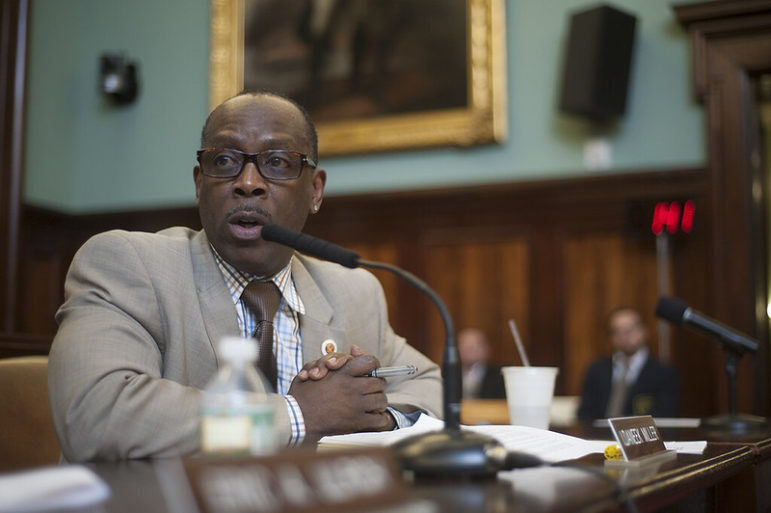Council aides, community board leaders and accomplished lawyers are among those hoping to win the crowded 27th district primary.

Official NYC Council Photo by William Alatriste
Daneek Miller, who has represented the 27th district since 2014, is term limited, paving the way for a wide-open race to replace him.Council Countdown is a partnership of City Limits, City & State, Gotham Gazette and the Queens Daily Eagle, offering coverage of the 2021 New York City Council races.
In a race that is almost certainly going to come down to which candidates is the most popular second or third choice among voters, a dozen candidates are vying for a Council seat in eastern Queens.
The 27th Council District covers Cambria Heights, Hollis, Jamaica, St. Albans, Queens Village, and Springfield Gardens. I. Daneek Miller has represented the area since 2014 and is term-limited out of office.
The candidates in order of their appearance on the ballot are:
- Nantasha M. Williams, a former chief of staff to Assemblymember Diana Richardson who ran unsuccessfully for an Assembly seat in 2016, and now serves as a public relations official with the Port Authority project to redevelop JFK Airport;
- Linda Guillebeaux, an entrepreneur and minister;
- Jason Myles Clark, an assistant state attorney general and president of the Metropolitan Black Bar Association;
- Rene A. Hill, an accountant and former president of Community Board 12;
- Jermaine Sean Smith, a veteran foster-care worker and nonprofit executive;
- Anthony Rivers, a retired police lieutenant;
- James J. Johnson, a onetime community liaison for Miller who now plays a similar role in Southeast Queens for the New York City Comptroller’s Office;
- Kerryanne C. Burke, an attorney who has worked as a legislative counsel in the Assembly and state Senate, for the Mayor’s Office of Contract Services and NYCHA
- Leroy Gadsden, a professor at Bronx Community College and former head of the Jamaica branch of the NAACP;
- Al-Hassan Kanu, the district director for Miller;
- Harold C. Miller Jr., a deputy commissioner for Community Engagement in the Mayor’s Office Community Affairs Unit who has played a role in running the “test and trace” system; and
- Marie M. Adam-Ovide, district manager for Community Board 8
The candidates have together raised just over $400,000 for the race but more than $1 million in public funds have been injected into the campaign. At last count, Johnson has the most financial resources with $160,000; Adam-Ovide and Williams aren’t too far behind. Gadsden and Rivers have relatively small war chests–$7,000 and $5,000, respectively—and Guillebeaux hasn’t reported any fundraising or spending at all.
Johnson has an especially interesting mix of donors, including NBA player Maurice Harkless, Jets quarterback Blessuan Austin and the mayor of Columbia, S.C., Stephen Benjamin.
Most of the district falls into Queens Community Board 12, which is notable for having the second-longest average commute of any district in the city at 49 minutes. According to the Department of City Planning’s district profile, the district is in line with borough- and citywide averages on many scores except for higher education: Only 21 percent of CB 12 residents have a bachelor’s or higher, well lower than the 32 percent Queens average.
CB12’s most recent annual statement of needs notes multiple concerns about wall in the district. “It is situated in the well-known flood basin of the world’s largest dam; John F. Kennedy Airport,” the report reads. “The Airport, built on wetlands, which was our natural drainage area, has greatly contributed to a lack of adequate rainwater run-off in our community.” That’s led to regular flooding and concerns about ground water. Schools and senior services are other top concerns.
The eastern third of the district is in Community District 13, where flooding is also a problem. That district stands out for having the worst access to open space of any district in the city: Only 39 percent of residents live within walking district of a park, making it the only district in the city where fewer than half of residents can do so.
While water issues and open space don’t get much attention in candidates’ campaign literature, multiple candidates name foreclosure as a top concern. The area was deeply affected by the 2007-2009 foreclosure crisis. Among the ideas: Kanu says he wants to provide more financial literacy training for area homeowners, and Miller says he will pursue “ a moratorium on foreclosures and tax liens to offer relief to homeowners as they recover from the impact of the pandemic.”
Among several issues she address, Williams stresses economic development, including a citywide commercial beautification fund to offer low-interest loans to stores, a “capacity building incubator program” and access to capital resources.
Clark wants to fund one-on-one after-school virtual learning opportunities “for students in need of additional practice during the pandemic,” as well as requiring schools to inform parents when they fail to provide academic services—like libraries, ESL programs and proper class sizes—so as to “empower parents to advocate for their children’s rights.”
Smith says he will “fight for parents to have the right to choose from a variety of free public schools” and wants social workers to walk the beat with cops.
Johnson advocates for a new community center in the district, property tax reform and expanded express bus services. He also pledges to “increase the required ratio of affordable housing units within new developments.”
Adam-Ovide wants to shift budget funds being used for temporary homeless housing, like hotel rooms, to provide more permanent housing voucher subsidies, and calls for stronger rent protections for small businesses. She has also pledged to donate half of her Council salary during her first term back to the community, according to a campaign spokesperson.
Burke stresses her support for increased access S.T.E.A.M. Education in district schools, foreclosure prevention and access to health care. Along the same lines, Hill says that, “a hospital in District 27 will bring quality healthcare and job opportunities to our community.”
Among other positions, Kanu says new construction is the only way to get significant affordable housing in the district. “We must welcome appropriate development on major corridors and in downtown Jamaica that can provide real additional affordable housing units while still respecting the character of neighborhoods in the Council district,” his platform says.
Miller promises to fight the MTA’s bus redesign plan—which he says is “flawed”—and press for $5 tickets for service to and from all Long Island Railroad stations in Southeast Queens.
In her criminal justice platform, Hill says a key step in NYPD reform would be to require New York City residency for new hires as well as programs to encourage public-school students to consider and prepare for a law-enforcement career. On housing, she believes the city “should look to down-zone manufacturing areas that are no longer being used for manufacturing for residential use.”
Guillebeaux, Gadsden and Rivers do not have much of an online presence. Rivers has been on this ballot before: He challenged Miller in 2017 and got about 2,200 votes, good for 21 percent of the vote. Turnout was only 13 percent in that race but a more respectable 22 percent in 2013, the last time there was an open race. There are now 83,560 registered Democrats in the district—79 percent of all voters, suggesting that the winner of the primary will almost certainly prevail in the November general election.
Primary Day is June 22 but early voting begins June 12.
Editor’s note: This story was updated on June 5, 2021, to include details of Adam-Ovide’s campaign platform.









